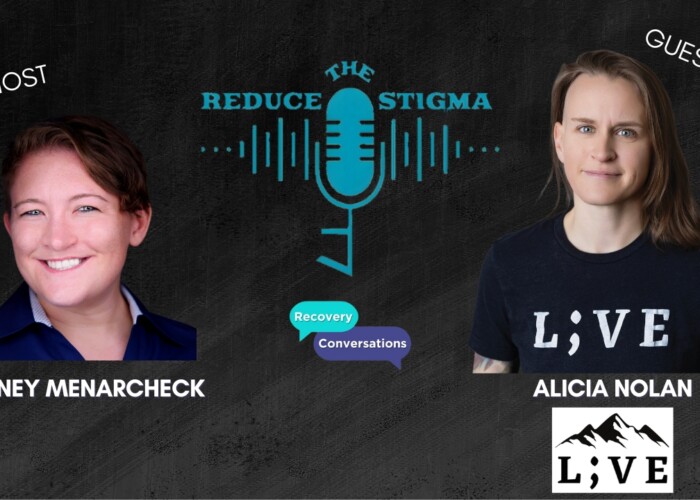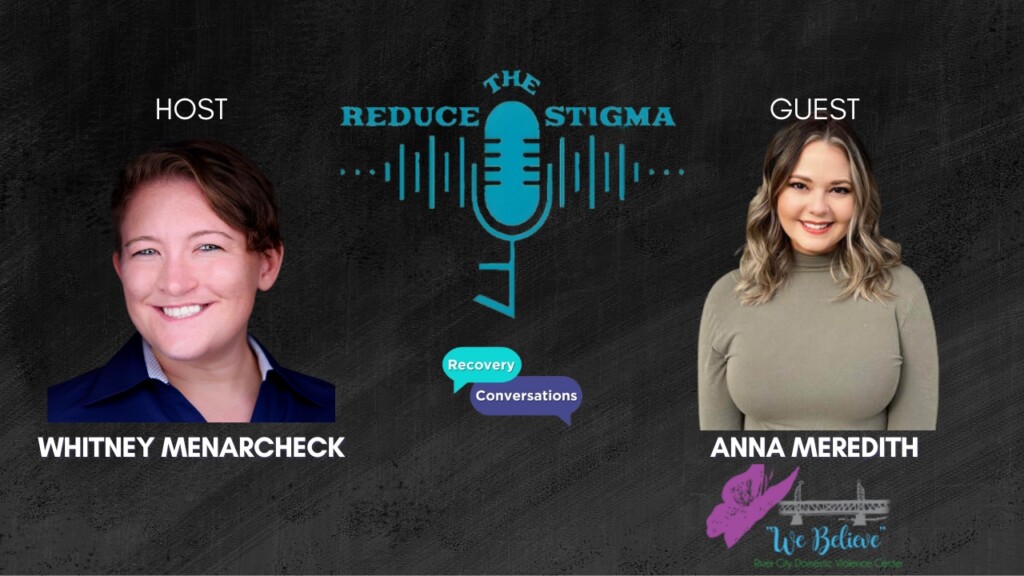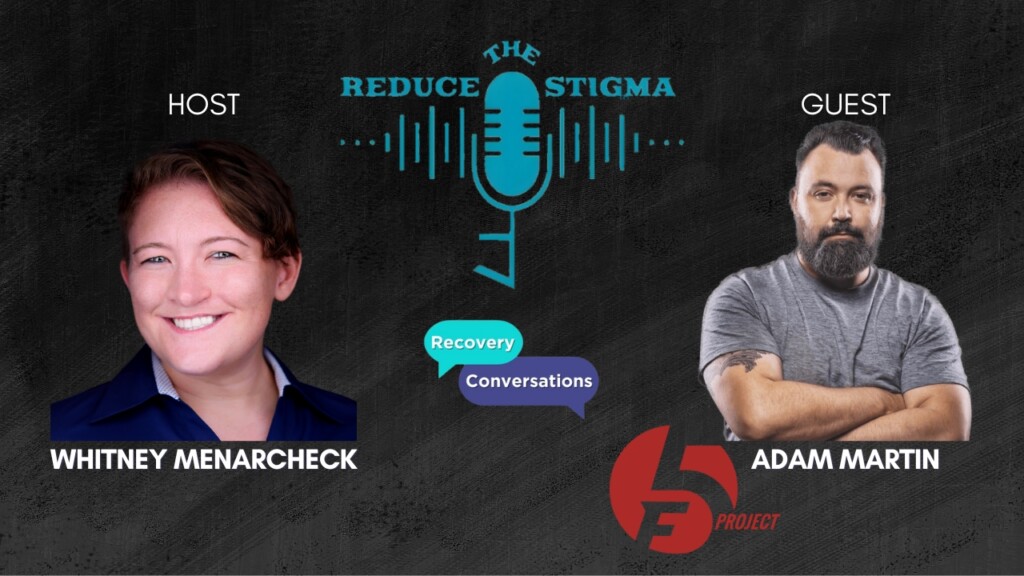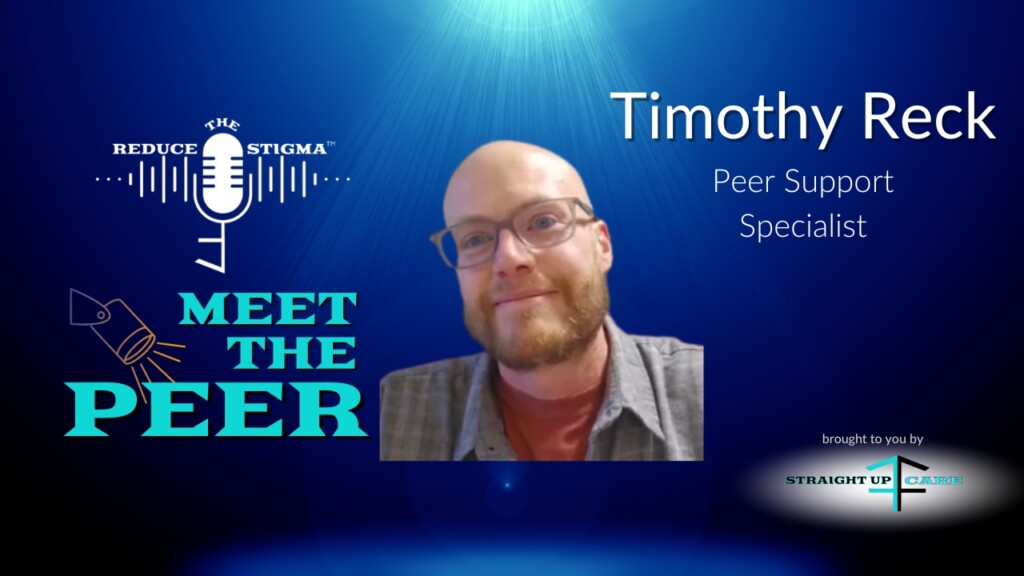Reduce The Stigma - Recovery Conversations: Raising awareness of suicide prevention and mental health with Alicia Nolan, Founder of Choose To Live
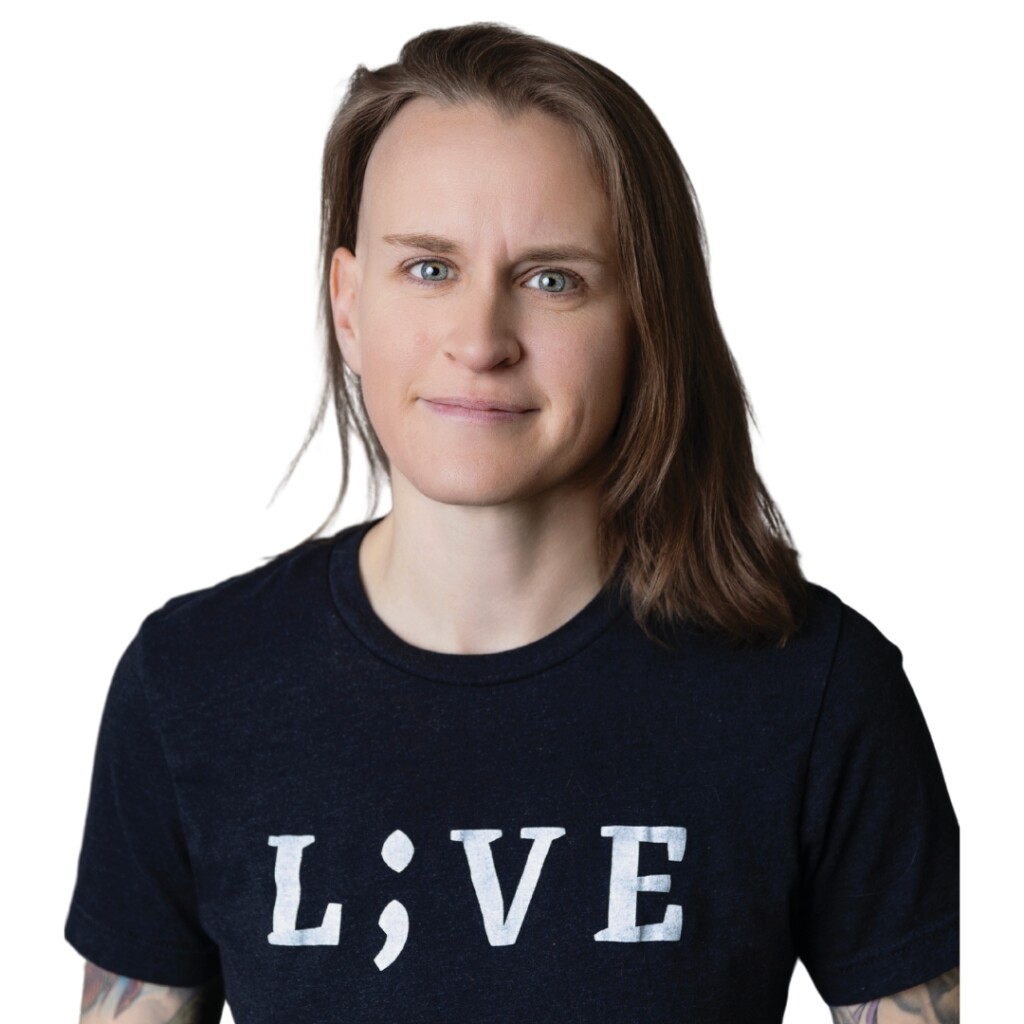
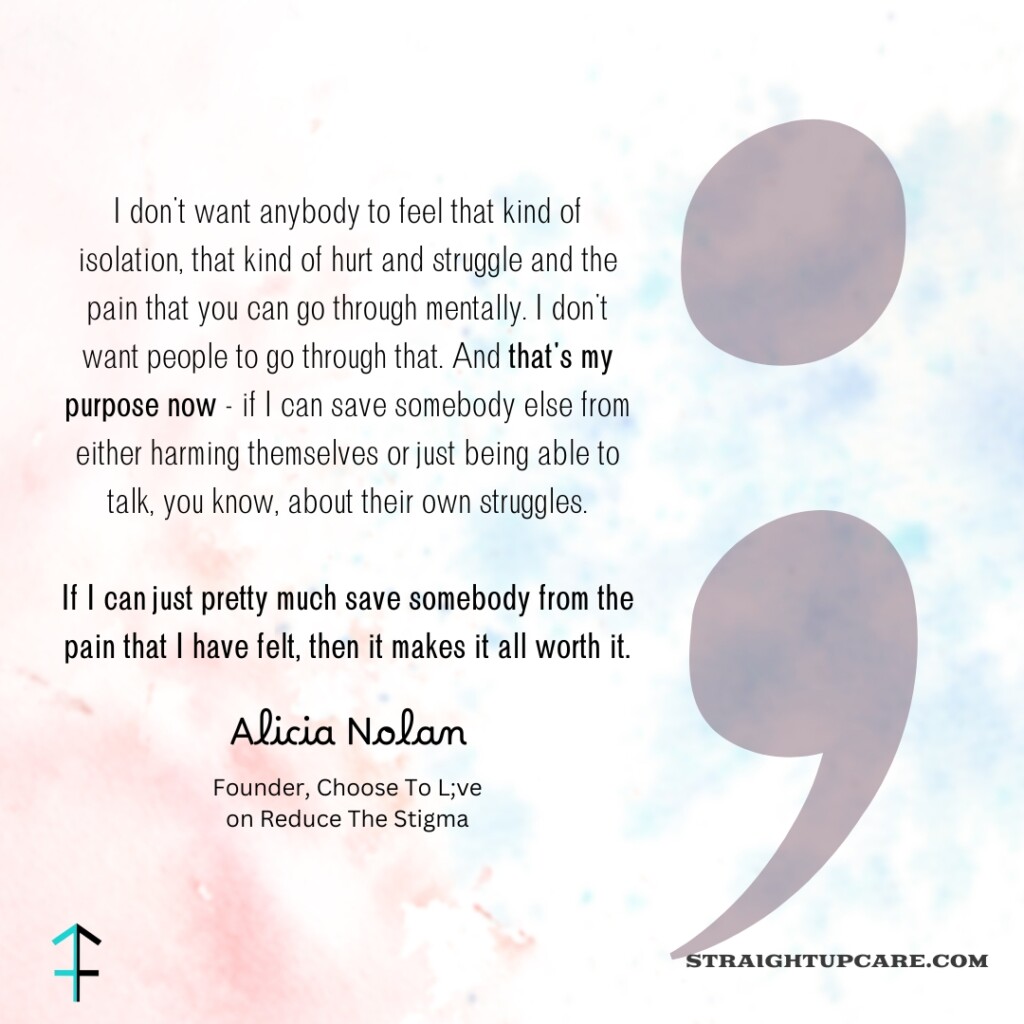
Suicide and mental health – let’s bring these topics out of the shadows because keeping them as the topics we’re too uncomfortable to discuss is guaranteed to lead to more deaths. How do we do that? How do we get people talking about things that we typically avoid? Enter Alicia Nolan, founder of Choose To L;ve, a company who is raising suicide prevention and mental health awareness through thoughtful apparel. Wearing an item from Choose To L;ve sends the message that you are a safe space, that you care, that someone who is struggling can trust that you will be empathetic and nonjudgmental. Let’s all join the effort to ensure anyone and everyone who needs someone to talk to feels safe reaching out and asking for help.
Catch the full episode to hear Alicia’s personal journey through loss by suicide and the creation of a mission-driven organization.
Are you in need of support? It’s ok to ask for help – you deserve it.
In case of an emergency, call 911. For 24/7, free and confidential support for times of distress or crisis, call or text 988. Learn more about the 988 Suicide and Crisis Lifeline.
To connect with someone with suicide and/or mental health lived experience, visit Straight Up Care and connect with a trained peer specialist who’s ready to support you.
Make sure you never miss an episode of Reduce The Stigma by subscribing on your preferred platform
Ways to Watch
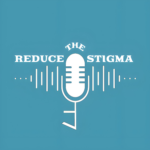
Watch on any device on ReduceTheStigma.com
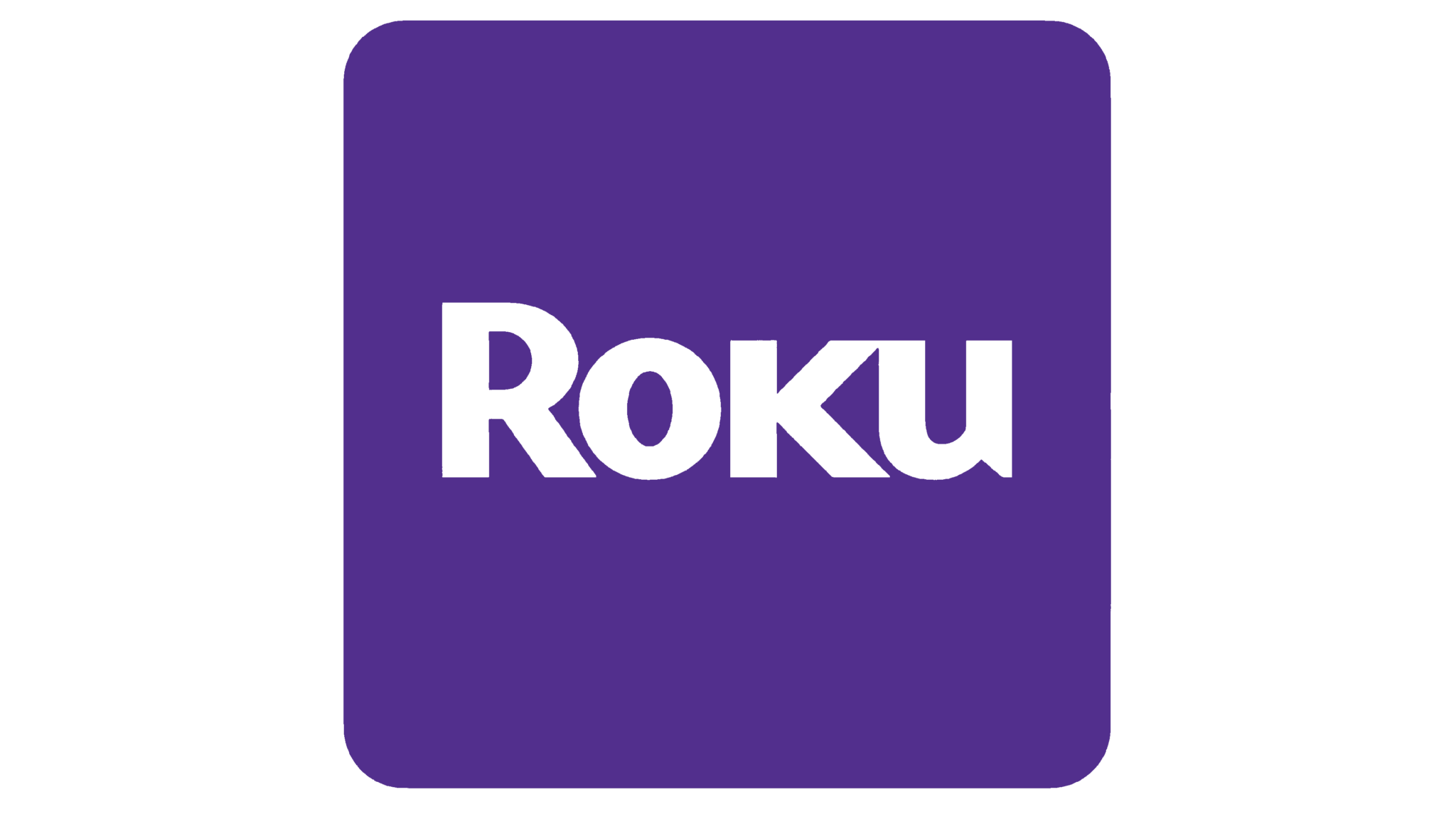
Install and Watch all Episodes on Reduce the Stigma RokuTV Channel

Install and Watch all Episodes on Reduce the Stigma Amazon Fire TV Channel
Ways to Listen
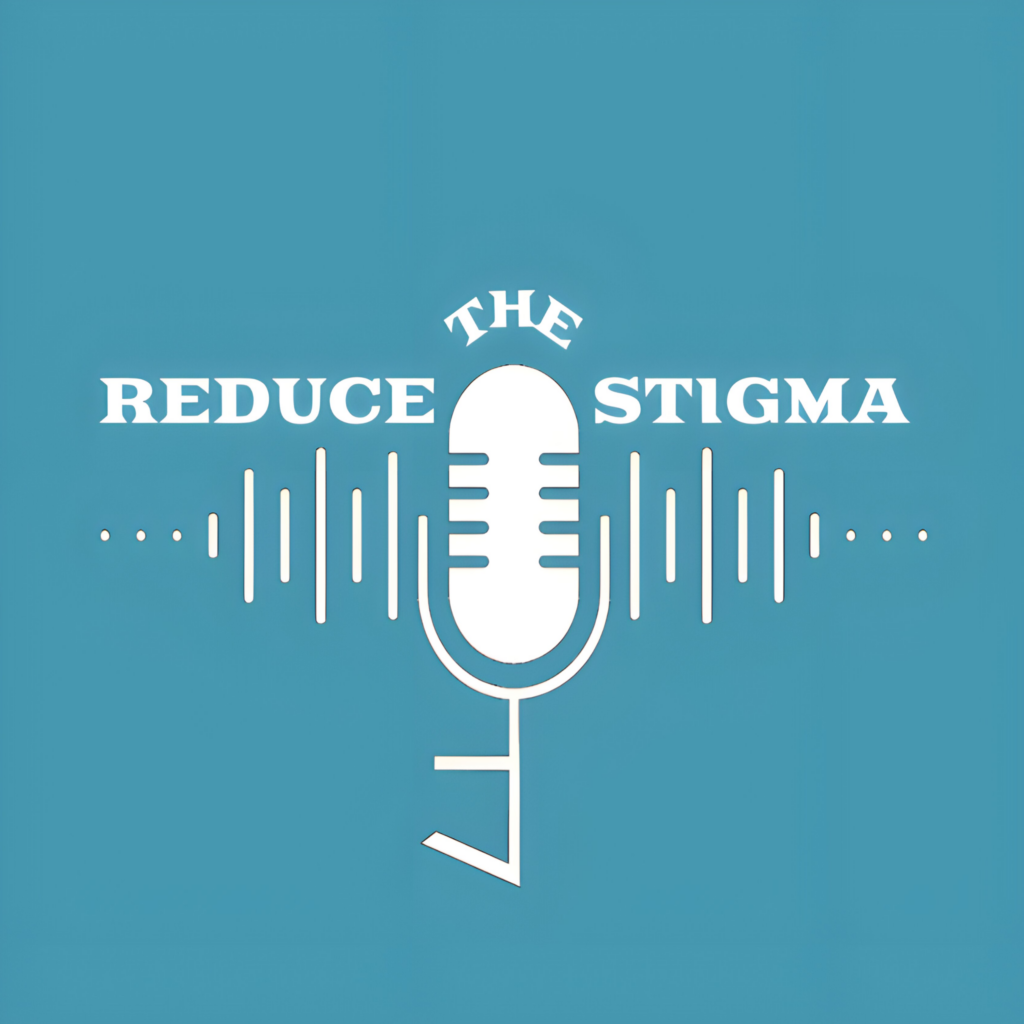
Our Podcast Website on Podops!
Listen on Apple Podcasts!

Listen on Spotify!

Listen on iHeart Radio!

Listen on YouTube Podcasts!
Follow Straight Up Care
Transcript
Whitney Menarcheck | she/her (00:00)
There are many experiences and topics that society tends to avoid discussing and perhaps none more so than suicide. Today’s guest is on a mission to save lives by sparking conversations about mental health and suicide prevention through the use of purposeful and empowering apparel. Stay tuned to hear the conversation with Alicia Nolan, founder of Choose To L;ve and get ready to be inspired as we reduce the stigma.
Whitney Menarcheck | she/her (01:32)
Hello and welcome to Recovery Conversations. Today’s conversation is with Alicia Nolan, the founder of Choose to L;ve, an organization dedicated to suicide prevention and mental health awareness. Thank you for joining me today, Alicia.
Alicia Nolan (01:32)
Thank you for having me.
Whitney Menarcheck | she/her (01:46)
I have started to familiarize myself with Choose to Live and am looking forward to hear it from your perspective because as I understand, Choose to Live is the outcome of a very personal experience of yours.
Alicia Nolan (01:51)
Thank you. Yes, I started Choose to L;ve in April of 2023 after my wife died by suicide in August of 2022. I was doing personal training when she passed away and you know when I had to go back to work something that I was very passionate about was health and fitnessa nd I started to incorporate a lot of mind-body connection and mental health into the conversations with my clients. And I started to recognize how much it meant to me to be able to talk about those topics with clients. And then I started to have a pull towards something bigger. I knew that I needed to do something bigger to get people to talk more. So I came up with my brand L;ve – the “I” is a semi-colon. And the next step was trying to figure out how to get people to see my brand. And that’s when I decided to do t-shirts, which I didn’t know how to do. And it’s not in me to use third-party sources. So I started researching how to make t-shirts, what the best and most cost-effective way to make my own. Screen printing seemed to be the way to go. And I just started doing YouTube and all the research. I think I probably invested like $250 or so on equipment, just to kind of start it up. And I started making my t-shirts and I have an amazing community, friends and family that just…
Whitney Menarcheck | she/her (03:20)
Wow.
Alicia Nolan (03:46)
I started buying them and then I just kind of continued to grow and get more colors and now I do sublimation laser engraving and all the things. I have sweatshirts, tank tops, various colors of everything, and pride shirts. I started off doing $3 of every t-shirt going to suicide prevention, specifically Pike’s Peak Suicide Prevention Partnership located in Colorado Springs and now 10% of all of my sales goes to that organization. And in the last year, I’ve been able to raise over $2,500 just from sales.
Whitney Menarcheck | she/her (04:22)
That’s remarkable. As a customer, because I am proudly wearing the racer back, I had no idea that you were doing this yourself. The quality is incredible. I’m just in awe.
Alicia Nolan (04:35)
Thank you. I appreciate that. Yeah. That’s one thing like as a business owner also, like I had to be good quality. I couldn’t not have good quality. So yeah, of course.
Whitney Menarcheck | she/her (04:42)
You’re right. Yeah and, you know, as I was looking at the shirts and selecting which one I wanted to proudly wear, I was struck by, you know, your brand name is Live. There’s clearly that suicide prevention component there. I was also struck by how the dot of the semicolon also makes it love. And I thought that was amazing because knowing, you know,
Alicia Nolan (05:09)
So it makes sense well. And I thought it was a great somebody.
Whitney Menarcheck | she/her (05:16)
personal reason you’re in this, that this was an act of love. It really just stood out to me as amazing to have that dual meaning of your brand.
Alicia Nolan (05:22)
It’s amazing. Yeah, I appreciate that. And I wish I could say it was done on purpose, but it wasn’t. But I have had people ask me, is it love or is it live? And yeah, they just kind of meld together with the perfect message, I guess. I think you did. And you said people are looking at how you made your work after. And I think-
Whitney Menarcheck | she/her (05:41)
They really do. And you said you were looking at how to get your brand out there and to get people talking. What was important about getting people talking? What were you hoping they’d be talking about?
Alicia Nolan (05:53)
When I first started it, it was just kind of a broad view of mental health. Um, that it’s okay to struggle and you can talk about struggling. Um, just getting people to talk, um, no matter what it is. And that’s kind of what has happened. Um, not quite unexpectedly, but on the level that I wasn’t expecting when I first started the project, uh, every last year was kind of about, uh, doing vendor events to see how um, how far I could take the brand or, you know, the response that I would get from it. Um, but the connections that I made at these vendor events were so incredibly powerful and sometimes overwhelming. Um, there were days that were just, they were emotional, emotionally draining some days, but in such a good way, like, cause you could feel that impact that you are making. You know, people see the semicolon, they see the brand and they just, they just want to talk to somebody and they’ll just come straight to my booth and they just want to share. They want to share their experience or show me their semicolon or whether it’s them who have struggled themselves or somebody that they know who has taken their life, they just want to share. And that’s what I hope people are inspired by when they see it, whether they buy it or see it on somebody else. Just building those connections and letting people know that it’s okay to talk about it.
Whitney Menarcheck | she/her (07:26)
I imagine that seeing the brand, seeing the semicolon, it’s also a symbol of a safe space for someone who cares either because of their personal experience or because they just are moved to care. And so you can talk to them, you can confide, you can be vulnerable, I imagine.
Alicia Nolan (07:33)
safe space for someone who cares. Yeah, and that’s a great point. Again, people come straight to it because they know what it is. A lot of people don’t know what it is and the semicolon and I get people to ask all the time. And sometimes that almost means more to me when people ask what the semicolon is. And then, you know, you get some people who see it and they, you know, they don’t want to talk about it. And that’s, you know, that’s okay, too. It’s what your comfort is. But at least, you know, like this is a safe place to share your story. Yeah, there is a lot of safety in that respect. Like you will not be judged. And I think that’s the biggest thing and that’s one of the biggest stigmas is people believe that they will be judged if they show any kind of struggling. And that’s what I hope to reduce.
Whitney Menarcheck | she/her (08:38)
Absolutely, and there’s the struggling, or there’s the stigma of you struggling as an individual, of someone you love struggling, of, you know, having lost someone by suicide, because that is an over, you know, I just missed. It’s kind of one of those, don’t want to touch it with the 10-foot pole topics for a lot of people, which only results in more people feeling alone and isolated and is…only going to perpetuate the pain.
Alicia Nolan (09:06)
That’s exactly right. I mean, one of my motivators behind it is not just my own mental health, having PTSD, anxiety and depression, but also because of my wife who, when she struggled or she was in her lows with her own mental health, she shut everybody out. She didn’t wanna talk to anybody. She coped in unhealthy mechanisms and that’s just what she did, and I don’t want anybody to feel that kind of isolation, that kind of hurt and struggle and the pain that you can go through mentally. I don’t want people to go through that. And that’s my purpose now is if I can save somebody else from either harming themselves or just being able to talk you know, about their own struggles. If I can just pretty much save somebody from the pain that I have felt, then it makes it all worth it.
Whitney Menarcheck | she/her (10:09)
There’s a power to obviously connection, right? Whenever we feel like there’s another person that is there 100% present, non-judgmental, there’s also a power in sharing a story for both parties, whether it’s the person hearing it who is maybe validating. They’re like,
Alicia Nolan (10:12)
the connection. Right.
Whitney Menarcheck | she/her (10:32)
It is part of that healing process for many people to be able to share their story and give their experience a new meaning.
Alicia Nolan (10:35)
that we have to share their story again.
Yeah, sharing is quite a tool that I think is almost, what do you call it? Like an unsung tool, what do you call it? Like it’s a hidden tool, it’s a hidden gem, if you will, is sharing your story with others because there is somebody out there who can relate and needs to hear that story. And that’s what I’m trying to do this year, I’m getting my story out there.
Whitney Menarcheck | she/her (10:50)
Yeah.
Alicia Nolan (11:06)
I’m in a couple of books now. I’ll have another book published next month. A couple of different perspectives of my story in each, but doing podcasts, getting out there, having my own podcasts, doing all the things, speaking at events, all of these things. This is what I’m doing this year. And a big reason for that is just because of the feedback that I have had from other people when they have either read my story or heard my story somewhere.
Whitney Menarcheck | she/her (11:11)
Wow.
Alicia Nolan (11:35)
is just, it’s so positive. And there’s so many affirmations that have just come out of this, all good things. 99% of the time, there’s always a couple of comments, unfortunately, that people need to make and that’s okay because 99% of the time, somebody is saying, thank you. Thank you for inspiring me. Thank you for just being able to talk about it.
Whitney Menarcheck | she/her (12:02)
Right. It reduces that shame and really is a bridge out to others. And I realized that I did probably what a lot of people do, which is I move past when you share in your experience. Because there’s so much that is to live, to choose to live that is based off of the loss of your wife. And I heard, and I want to go back to you saying,
Alicia Nolan (12:08)
in supporting Fairchild.
Mm-hmm.
Whitney Menarcheck | she/her (12:31)
I have lived experience too. Can you speak a little bit to what you have experienced in addition to the loss of your wife?
Alicia Nolan (12:38)
pertaining specifically to suicide? Okay. Yeah, absolutely. Specifically to suicide, you know, Nicole wasn’t the first person that I’ve known to take their life. I had a buddy 18 months prior to that and on active duty military I actually found somebody afterwards.
Whitney Menarcheck | she/her (12:41)
or to whatever you would be comfortable sharing.
Alicia Nolan (12:57)
Um, it was, it was the hardest time that I personally went through. Um, obviously losing the person that you knew you were going to be with forever. There was no doubt in my mind and either one of our minds like that we were going to be together forever. Uh, we had plans, we had plans that weekend. We had plans a couple of weeks out, you know, concert tickets, you know, we had plans because we were each other’s person. So, when that was gone, I personally found myself in a very dark place. And, you know, then another piece of that story is just I’ve been sober for three and a half years now. And that was something at the time that I knew that I didn’t want to get back into. So I had one of the first guys actually came after I was notified by the sheriff. He asked me what he could do. And I said, take all the alcohol, of course it was my wife’s alcohol, but I was like, take it all. You’re like, I don’t want to go down that path. I knew myself enough to know when I have gone through hard things in the past, that’s what I have done. And that’s a place that I refuse to ever see myself in again. Um, and I think that helped me remain sober helped me kind of have a clear head, even though the fogginess is real when you have traumatic events. Um, which is still not fully recovered. But I was able to just kind of work through the pain and kind of find my way forward. I try to stay away from terms like moving on. I like moving forward, personally speaking. So trying to figure out that path afterwards. And one of the most significant things after…she took her life was my community and my friends. When they asked me what they could do, I said I didn’t want to be alone. And they were with me for the first month. They stayed at my house. They were there all day. I was not alone for a moment. Well, in that first month, in that first month. So it really allowed me the opportunity to kind of just figure out life and kind of pull myself out of that darkness a little bit.
Whitney Menarcheck | she/her (15:17)
All right and my heart goes out to you for your experiences and, you know, doing so while also in recovery. Of course, you know, loss can be a significant risk factor for returning to any use. And also, I want to applaud you for communicating your needs. I don’t think people do that always. They feel like a burden. And I know I personally sometimes expect people to know what to do, but how can they know what I need? Sometimes I don’t know what I need, but if I have found like, wow, I don’t want to be alone, we can communicate that. Was that a hard thing for you to be able to say this is what I need?
Alicia Nolan (15:47)
you want to do it with you. Yeah I think we should be able to say, I changed that day. I changed that day. I call it my old normal and then my new normal. There are good and bad things in ways that I have changed. And when that happened, there was just kind of a switch when it came to being honest with how I was doing. From that moment, I was like, somebody asked me how I’m doing, I’m going to be honest. There’s no more, I’m good, I’m fine. There’s no more of that. If you ask me how I’m doing, I’m gonna tell you how I’m doing. Cause I mean, that’s part of the problem too. So it wasn’t after that experience, it wasn’t hard for me to tell people exactly what I needed. I think part of that too, along with trauma, I think I just had been so torn apart.
Whitney Menarcheck | she/her (16:37)
Right.
Alicia Nolan (16:53)
something happens to you. You have a new level of self-awareness. I know more about myself now than I ever thought I would. How I operate, things that I need. There’s just almost clarity, in a sense, in a weird way, about myself that I have. Yeah, it’s a very strange thing to feel prior to the event, I don’t think I necessarily knew how to express the things that I needed. I had spent a lot of my life catering an empath, so making sure everybody else is okay. You know, that’s, you know, just making sure everybody else is okay. And I think that moment just, it kind of, it kind of helped me realize that I also need help sometimes, you know, like I’m allowed to be myself or express who I am or all the things. Yeah, it’s a wild, wild experience.
Whitney Menarcheck | she/her (17:53)
And hearing that you served in the military as well, that is not exactly an area where you’re encouraged to be vulnerable. So I’m sure that had a lasting effect as well on the challenges of putting yourself first and asking for help. And to, you know, you said it’s part of the problem whenever we don’t communicate our needs.
Alicia Nolan (17:54)
in certain.
people.
Thank you.
Whitney Menarcheck | she/her (18:16)
Can you elaborate on that a little bit?
Alicia Nolan (18:19)
Yeah, absolutely. One, it’s not common for people to have enough self-awareness to know what they need. My therapist tells me a lot, like, wow, like you really know how your brain’s working, operating and yourself. I’m like, yeah, I know. I just do now, but a lot of people don’t have that. And that’s kind of number one is being able to deep dive into yourself and…understand those needs. And then next is just expressing that you need help. Again, it’s still looked at as weak or a burden, as you said earlier. I’ve felt those things my entire life, starting as a kid. You know, my mom specifically, she wasn’t a very compassionate and nurturing type. So I was used to hiding how I was really feeling and not knowing how to express those. And quite literally, it wasn’t until I was 36 years old that I started to feel like, no, I can be honest about it. And it needs to be something that everybody does. And a lot of that is because of the judgment, because you’re going to get judged for being weak or you’re going to get judged for…
Whitney Menarcheck | she/her (19:29)
Mm-hmm.
Alicia Nolan (19:35)
whatever how you’re feeling. But it really starts with us as human beings to change how that looks. It starts with us being non-judgmental and understanding that everybody has different experiences and everybody is completely their own person and views things a different way as the next. And we also need to understand that we don’t have to fix everybody that comes to us, a person just needs you to listen. And that is the best tool that we have as human beings from one to another is just the ability to not talk about ourselves or our opinion on something, but just to listen and hear somebody out.
Whitney Menarcheck | she/her (20:16)
Yes. I mean, what else do you say to that? It’s so true. Just being able to be present and focus on the person. And that’s, I don’t think that’s ever been easy for people. It’s definitely harder whenever you have phones dinging and, you know, all these different things. And that’s when we can…you know, when people can really feel overlooked is whenever we aren’t stopping, slowing down, and just saying, I’m here. And not just, oh I’m here for you, but like, I am here, I am present, I am listening, and I am receptive, and I am here with love.
Alicia Nolan (20:58)
Yeah, absolutely. Yeah, so much needs to change.
Whitney Menarcheck | she/her (21:02)
Yeah, isn’t that the truth? And we, well maybe we have an opportunity here to challenge ourselves, I’ll challenge myself, as well as everyone listening, that whenever you ask, how are you, to mean it, to be ready for those who are brave like you Alicia, who are going to say, this is how I really am. Let’s, let’s.
Alicia Nolan (21:04)
Hehehehe
Whitney Menarcheck | she/her (21:25)
invite those conversations rather than being passive, oh, I don’t know, should I ask? Should I ask if they’re okay? Should I, well, it’s been a month, isn’t everything better after a month?
Alicia Nolan (21:38)
Oh my gosh, so much. Yeah. And, you know, there is understandably, there’s some people who just don’t know what to do. And you know, after my wife passed, it was very clear, the people that I could just talk to. And there were some that were just super uncomfortable, didn’t know what to say, do or anything, and that’s okay. You know, that’s just who they are.
Whitney Menarcheck | she/her (21:41)
Yeah.
Alicia Nolan (22:02)
And that’s okay. I love that person just as much as the next. But it was kind of apparent, like who I could absolutely just unload everything that I was going through at the time. And those who are just there to be with me, which in a lot of cases is even more of what I needed. So, yeah.
Whitney Menarcheck | she/her (22:25)
Yeah. And I’m glad that you brought up that not everyone is going to be able to be that way. I mean, for whatever reason, we all have our own histories and it could be something that triggers a pain for somebody or they just don’t know what to do and they’re fearful of doing something wrong. So they may be like, I’m going to stick to what I do know how to do. So I certainly don’t want to
Alicia Nolan (22:28)
Thanks. Yeah.
Whitney Menarcheck | she/her (22:51)
if you can make that offer, right? And be the person who just maybe is like, let’s just go for a walk. And that’s not only after the big event, right? It’s not just after the death of someone. That can be, you know, one of your components of Choose to Live is mental health awareness. That is while some, you know, reach out to someone when you see them acting a little differently too. What’s going on?
Alicia Nolan (22:55)
Thank you. Yeah, that’s the point it is not all the way to the end. That is not something that we try to do. We’ve seen it on TV, we’ve watched it on HBO. What’s going on? What is being.
Whitney Menarcheck | she/her (23:21)
Right? Be that proactive source of support, I guess, is what I’m trying to say. What do you think about that?
Alicia Nolan (23:26)
What do you think about that? Yeah, so I actually did a little training. It’s a one-day training called Mental Health First Aid. And it’s fantastic, it’s virtual. I encourage everybody to do it because it goes through exactly that, just kind of recognizing those signs, being there to listen, and then understanding what resources are available. This is a course that anybody could take. There was a lot of healthcare professionals in the one that I was in, but I was the only one that’s like my own business and this is just what I wanna do and the knowledge that I wanna spread. But it’s such a useful tool to have for, I mean, not just strangers, but your friends and family to be able to recognize those signs, but also just knowing the resources that are available in your area. Yeah, and again, just I’m going to hit that listening thing. Like you don’t even have to say anything. Sometimes just let, let somebody talk. Sometimes that’s just all they need. But, um, yeah, I encourage everybody to, to look up mental health first aid. Um, cause it, it was a great experience and I learned a lot from it.
Whitney Menarcheck | she/her (24:42)
Yeah, very neat. Oh, we’ll have to make sure we include that for everyone to be able to find. And just the work you’re doing to make this a more known and recognized and part of the daily narrative, rather than that when bad things happen, we pull it out of the metaphorical closet and recognize it and so as we start to wrap that up here, I have two questions for you. And one I’ve only ever asked the co-founder of Straight Up Care, but I think that I’m going to love hearing your response. Fast forward into the future when choose to live has become your dream of what it could be. What does that look like?
Alicia Nolan (25:20)
Oh boy. Mm-hmm. Um, on a football stadium, one, uh, um, but two, I want to be kind of the leader behind a mental health reform in the United States. That is my ultimate goal. That’s where I want to be. That’s what I want to be a part of because we have so much work to do in this industry. Um, from the cost to the inch, I mean, just the lack of help and resources. Um, it appears like there’s more resources available, but believe it or not, there’s places like schools that don’t have them available. You know, it’s just starting from my city, my County to my state and growing from there. We just have a lot of work to do. Um, but that is where I see myself. One, I want my brand everywhere. I want people to see it. Um, I call it a brand with a purpose because that’s what it is. Um, but also just kind of be part of the pack that makes a major change to our mental health care industry.
Whitney Menarcheck | she/her (26:39)
Please keep us all updated on how we can support that mission. It needs to happen. And then my final question for you is, if people take only one thing away from our conversation today, what would you like that to be?
Alicia Nolan (26:55)
Just one. I think the biggest takeaway I like for people to take or to carry with them at least and let it resonate with them is just that it’s okay to reach out and ask for help.
Whitney Menarcheck | she/her (26:57)
I know, it’s hard.
Alicia Nolan (27:14)
Of course, there’s 988 if you’re in a crisis and really need somebody to talk to. It’s okay to speak up and say how you’re really doing. And it’s very possible that a lot of people already have somebody in their mind that they could go to and know that we’ll listen. You’re not a burden ever. Even if you have to schedule a time, that’s one of the…strategies used in mental health first aid. Like if somebody comes to you and you’re about to go to a meeting, like absolutely schedule a time with that person in a couple hours if you can. You’re soon available and make sure that person is heard. So just speak out and ask for help.
Whitney Menarcheck | she/her (28:00)
Yes, and you know, anyone who’s out there, who’s ready and willing to be a safe space, check out Choose to Live, rep the brand. Let’s all just like have it inundated everywhere so that people are so used to seeing it and see it as a badge of that someone who cares and that I can talk to if I need to. So how can people connect with you Alicia? How can they support your work?
Alicia Nolan (28:31)
Yeah, absolutely. My website is choose to live.org. I have my shop on there. I have my blog on there, which I’m also very open about my healing journey. I have quite a few up. You can find me on Instagram, choose to live.org. is spelled out. If you search live with a semicolon on Facebook, you’ll see my live page pop up. So there’s a few, yeah, there’s a few places.
Whitney Menarcheck | she/her (29:00)
Great, great. Well, thank you so much for coming on, sharing with us your story, also letting us bear witness to Nicole and your love for her, and just for everything you’re doing to truly make this world a little bit better.
Alicia Nolan (29:21)
I appreciate it, likewise.
Whitney Menarcheck | she/her (29:23)
Alright, well everyone please share this episode so that we can spread awareness of Choose to L;ve and continue to Reduce The Stigma.
